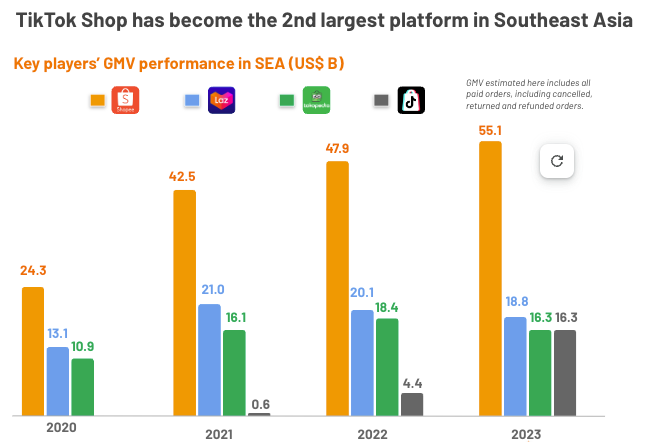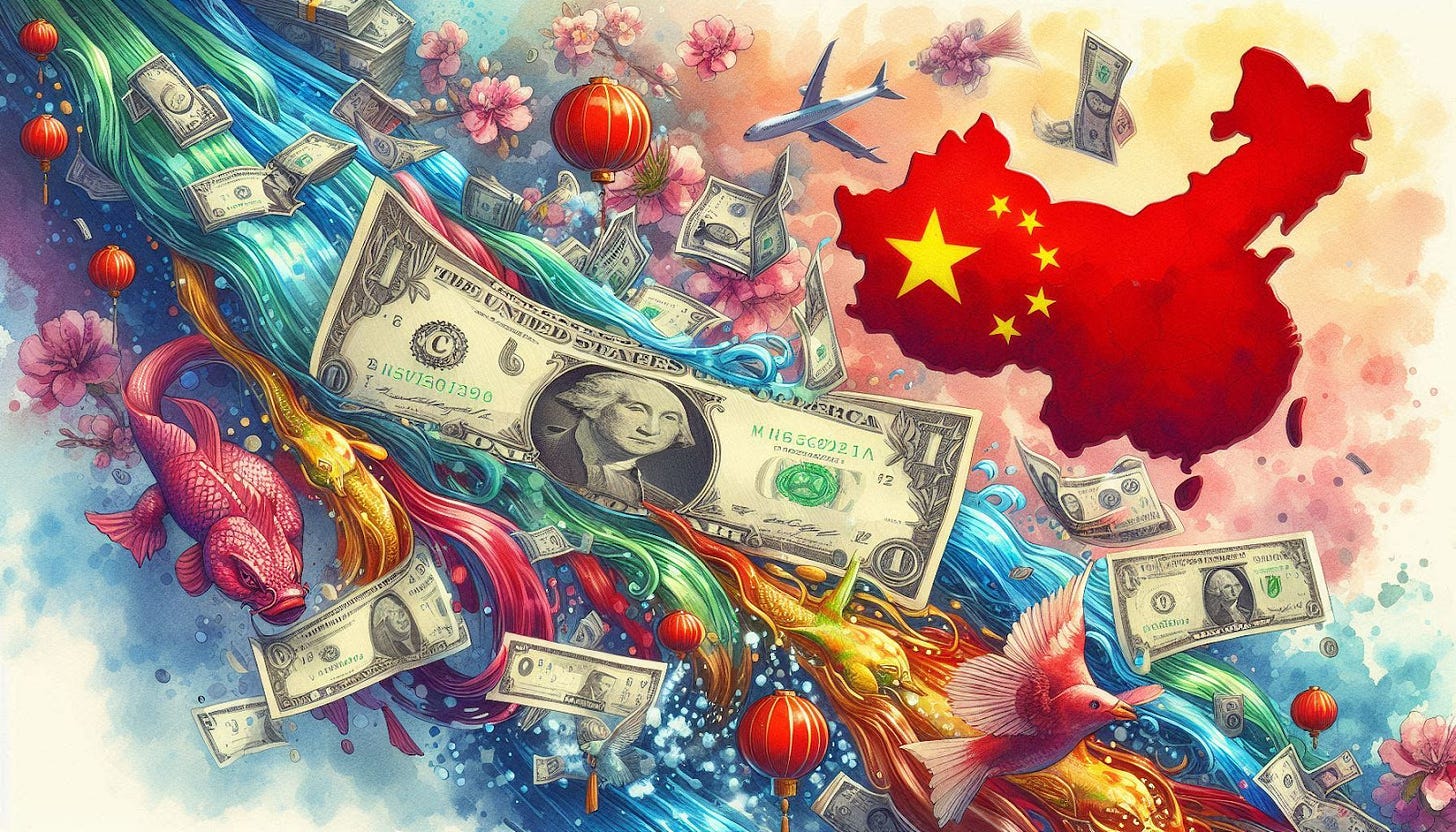Welcome back,
This week we are focused on an insightful new report on e-commerce that shows TikTok is already a major e-commerce player in Southeast Asia. That seems to have happened overnight but the groundwork has been in place for some time. The report shows, for instance, that while market leader Shopee and rival Lazada were laying off staff to improve their costs, TikTok Shop was actively adding recruits to grow its presence and refine its focus. Lots more on that below.
We also have details of a potential $10B IPO in India, how Jack Ma enriched a high-profile Chinese criminal and why it is the end of an era for overseas venture capital investment in China.
Elsewhere, did you know that Bangladesh has had no internet for days? And that Netflix is finally seeing impressive results in India? Or that Hong Kong is plotting to develop its own ChatGPT-like service? All of that and more is in this week’s newsletter.
See you again next week!
Jon
PS: Follow the Asia Tech Review LinkedIn page for updates on posts published here and interesting things that come our way. If you’re a news junkie, the ATR Telegram news feed has you covered with news as-it-happens.
-
Report: TikTok is already a major e-commerce player in Southeast Asia
TikTok is fast becoming a key player not just in social media, but online sales as a new report has shown.
Singapore-based Momentum Works’ newest annual e-commerce report shows TikTok has zoomed past Alibaba-owned Lazada to become Southeast Asia’s second largest seller of online goods beyond Shopee. That’s largely courtesy of its acquisition of Tokopedia in Indonesia, which ranked third last year, but TikTok’s own Shop e-commerce product grew its total sales nearly fourfold over the last year, according to Momentum Works. Combining the two, TikTok-Tokopedia has nearly doubled the sales of Lazada as the excerpted slide below shows.
The caveat, of course, is that Tokopedia is only active in Indonesia, where it has struggled to grow in recent years. Aligning with TikTok may fix that issue but there’s work to be done in other markets if TikTok is to catch Shopee.
The full report sheds fascinating light on Southeast Asia where e-commerce sales continue to grow, but the big increases come from Vietnam and Thailand and not Indonesia or elsewhere.
-
Indian ad giant reportedly targets $10B IPO valuation
We’ve written about the trend for Indian tech startups to redomicile with a view to joining the growing numbers of domestic tech IPOs and now there’s an update on another. Adtech firm InMobi is said to be looking at an India-based IPO next year which could value it at as much as $10B.
That would be a blockbuster valuation beating a number of recent ‘big name’ firms to have gone public since Paytm listed at a $20B valuation in 2021.
Indeed, Glance—an InMobi-owned startup that operates lockscreen entertainment and ads for Android devices—is reportedly closing in on a funding round that could reach as high as $250M. Google is already an investor and it is said to be leading this round, which could value Glance at more than its previous $1B valuation. This business would be a contributing factor to InMobi’s lofty IPO valuation goal.
-
End of an era: US venture capital is no longer a force in China
This newsletter often covers the ongoing US-China political tension and the resulting fallout, and another major piece of data just landed. According to statistician Dealogic, foreign venture capital deployed in China’s reduced by 60% year-on-year in 2023 to reach $3.7B.
Further, the amount of foreign VC in China last year accounted for a mere 10% of the numbers in 2021, which was an all-time high.
The figures offer a stark insight into the decoupling of the technology and investment worlds of China and the US. Money from the US and other parts of the world helped firms like Alibaba, Tencent and ByteDance reach dizzying heights. But the next generation of Chinese tech firms is far more likely to rely on state-backed funds or local VCs in China. Indeed, even international VCs have been forced to jettison their China-based operations, giving them an even narrower window into China’s startup ecosystem.
-
Jack Ma unwittingly enriched billionaire Chinese criminal through Alibaba investments
A years-long investigation from The New York Times has shown that a high-profile criminal, convicted of corruption tied to China’s political elite, made hundreds of millions of dollars from previously unknown investments in a number of Jack Ma’s companies.
Ma is said to have been unaware that Xiao Jianhua, a billionaire businessman who was sentenced to 13 years in jail in 2022 after being taken from a Hong Kong hotel in 2017, had used proxies to invest in Alibaba, Ant Group, Alibaba Pictures and investment firm Yufeng Capital. That’s despite Mr Ma’s very public dislike of political figures in China.
“Finding them connected this way shows that the Chinese system is so murky that everyone gets caught in the same web,” a Harvard professor who studied Mr. Xiao told The New York Times.
Wall Street’s semiconductor index lost more than $500B in stock market value after a report said the US was mulling tighter curbs on exports of advanced semiconductor technology to China link
AMSL’s China shipments rebounded in Q2 but further restrictions loom link
Eindhoven University of Technology, a Dutch technical university that is a key feeder for ASML talent, has been caught in the crosshairs of the US-China chip war as Washington questioned why it has so many Chinese students as it looks to limit Beijing’s ability to produce semiconductors link
Huawei distributors have started giving customers details of the processors used inside the company’s flagship smartphones, even the firm itself has said nothing publicly link
The company completed construction of a $1.4B campus in Shanghai, designed to lure foreign talent link
The latest example of Huawei increasing new monetisation streams (following the impact of US restrictions) sees it sue Taiwanese mobile chip developer MediaTek over alleged infringement of its IP link
Tencent is said to be among the potential investors in Wintermute Trading as the crypto trading firm considers raising money at a valuation of $2B link
Intel’s venture capital arm has emerged as one of the most active foreign investors in Chinese AI and semiconductor startups—with over 30 investments—despite receiving billions of dollars from Washington to fund a technological arms race with Beijing. It is unclear whether it will be forced to divest or breakout its China-based deals due to political pressure and new regulations link
China’s move to require generative AI models to obtain the approval of the Cyberspace Administration of China before being released to the public—including 20,000-70,000 questions to test the safety of answers—could slow down development and strangle the country’s nascent AI industry link
Shein and Temu face uncertain times in South Africa, the EU and other markets amid high-tariff push link
Crypto exchange WazirX suffered an exploit resulting in the unauthorised transfer of over $230M in crypto assets from a hacker that’s suspected to be linked to North Korea link
India has been tough for Netflix but it emerged as its top market in Q2—ranking second worldwide for new paying customers and third for revenue growth link
An Indian court has initiated insolvency proceedings against edtech giant Byju’s, once-valued at $22B link
Byju’s unsuccessfully challenging the proceedings link
The country is finalising rules to cut visa delays for Chinese technicians from 4-5 months to 30 days in response to complaints from businesses saying restrictions hurt the country’s ability to become a manufacturing hub link
Mitti Labs, a startup founded by Harvard Business School alumnus, aims to make rice farming less harmful to the climate by limiting methane emissions by 50% and water wastage by 30%—raised $3M to start out in India link
India may be the world’s second-largest smartphone market after China with around 750M users, but it is struggling to convert new smartphone buyers due to price as cheap feature phones retain appeal with many link
Still, Apple’s annual sales in India hit a record of almost $8B up around 33% link
Google backed Namma Yatri, a ride-sharing app with a no-commission model, after joining its $11M pre-Series A round link
UptimeAI, an AI startup specialising in manufacturing and heavy industries, raised $14M link
Paytm reported revenue down 36% as losses more than doubled following a crackdown on its banking business earlier this year link
After Ola quit using Google Maps to save a claimed $1B, Google slashed the price of Maps for third-parties in India by 70%—it is unclear whether Google has seen Grab’s own mapping solution, which it has used for several years, as a similar threat link
Sea hired Natalia Goh, formerly head of rival Trust Bank, to lead its Singaporean digital bank MariBank link
Malaysia has transformed former wild jungles and palm oil plantations into a thriving hub for data centers and AI, attracting major players like Nvidia, TikTok, and Microsoft in a race to establish cutting-edge digital infrastructure. link
Singapore-based Lhoopa raised $80M to tackle the lack of affordable housing in Southeast Asia, starting with the Philippines link
Temasek plans to invest up to $10B on financial services and healthcare tech in India over the next three years as it shifts focus away from China link
The Hong Kong government plans to adopt its own ChatGPT-style tool after OpenAI blocked developer access to its services on Mainland China and Hong Kong link
Chinese AI giant iFlytek is setting up an international headquarters in Hong Kong as part of a $50M investment link
Hong Kong has announced a first batch of stablecoin trials from participants including Standard Chartered Bank and Animoca Brands link
South Korea introduced a new regulatory framework to force digital asset providers to keep user deposits separate from their own funds following the disastrous collapses of Terra/Luna and FTX in 2022 link
Prosecutors filed an arrest warrant for Brian Kim, the founder of Korean internet giant Kakao, as part of an investigation into alleged stock market manipulation related to a high-profile bidding war for SM Entertainment, one of the country’s biggest music labels link
Samsung is buying UK-based knowledge graph startup Oxford Semantic Technologies link
US will award Taiwan’s GlobalWafers up to $400M to boost US semiconductor wafer production link
TSMC now makes more than half of its revenue from high-performance computing, the segment of its business powered to new heights by runaway AI demand link
But analysts argue that chip growth alone isn’t enough to protect TSMC as there are rising political risks for the company, the companies it serves and others that operate in Taiwan link
A profile of Bhutan’s first AI startup: NoMindBhutan link
The internet and some television and mobile services were offline for days in Bangladesh following nationwide strikes and violent protests—the situation nullified the tech industry and internet workers in the country link







